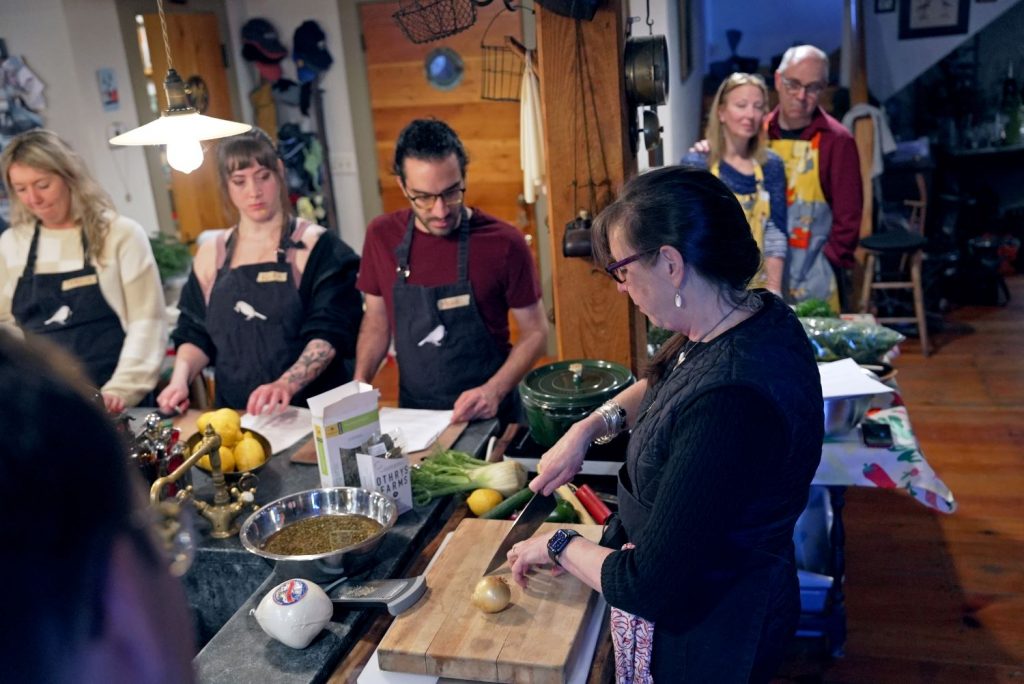CAHNR alum Nancy Kirkiles-Smith ’85 (CLAS) ’96 (CAHNR) is no idler. In addition to working as a full-time research scientist at a cancer startup, she runs a retail kitchen store, hosts and teaches cooking classes, and is a Duke-certified Integrative Health and Wellness coach. “I can’t imagine not having everything I do,” says Kirkiles-Smith.
 Kirkiles-Smith’s interest in health and nutrition began in childhood. Her father, a Greek immigrant, owned a restaurant in New Haven. When Kirkiles-Smith was in third grade her father had a heart attack. This made the whole family more aware of their diet. “We’ve always been very conscious of what we ate and how it might relate to health,” says Kirkiles-Smith.
Kirkiles-Smith’s interest in health and nutrition began in childhood. Her father, a Greek immigrant, owned a restaurant in New Haven. When Kirkiles-Smith was in third grade her father had a heart attack. This made the whole family more aware of their diet. “We’ve always been very conscious of what we ate and how it might relate to health,” says Kirkiles-Smith.
As an undergraduate at UConn, Kirkiles-Smith studied cell biology, with plans to go to medical school. But when she decided to get a master’s degree before applying to medical school, her path changed. Kirkiles-Smith studied Animal and Nutrition Science at the University of New Hampshire, where she worked on studies of beta-carotene metabolism. Carotenoids, including beta-carotene, are colorful plant pigments found in foods such as carrots and green leafy vegetables, which have powerful antioxidant and anti-inflammatory properties. Kirkiles-Smith decided to pursue a career in research and earned a PhD in nutritional sciences at UConn, working under Professor Harold Furr.
After graduating, Kirkiles-Smith did a postdoctoral fellowship in immunobiology at the Yale School of Medicine.
“I thought that someday I would combine nutritional science and immunology but that was before the microbiome became huge.”
At Yale, after her postdoctoral work, Kirkiles-Smith remained as a staff scientist and laboratory manager in the laboratory of Dr. Jordan Pober. There, she developed humanized mouse models, a first for her career, to study the allogeneic immune response to organ transplantation. Now, humanized mice are popular models in many areas of research.
“I’ve always been ahead of the curve when it comes to things,” says Kirkiles-Smith.
Smith now works for a biotech startup, called Normunity, developing new cancer treatments. There are two types of tumors: “hot” and “cold.” The body’s immune system can infiltrate and fight “warm” tumors but not “cold” tumors, which are the most solid tumors. As a senior scientist at Normunity, Kirkiles-Smith is working to “warm” “cold” tumors. Using the humanized mouse models that Kirkiles-Smith has worked with for most of her career, she investigates what happens when she injects Normunity compounds into different cancer models.
“It’s exciting to be in that kind of breakthrough discovery that goes against the current dogma,” says Kirkiles-Smith. Normunity is closely associated with the Yale laboratory led by Dr. Lieping Chen, a pioneer in the field of immuno-oncology.
In another chapter of her life, Kirkiles-Smith has returned to her roots in nutritional science. One day, Kirkiles-Smith’s brother, a sculptor and metalsmith, asked her to help fill his kitchen design showroom with small retail items that people could buy while visiting. She enjoyed establishing a retail space and introducing products that had design and quality.
“Finally, after about six months he said: ‘You’re covering my stuff, you’ve got to get your own place’,” says Kirkiles-Smith. She realized how much she enjoyed the retail space, so she and her husband opened a kitchen shop in Essex.
As the business grew, people would always ask her if she would run cooking classes. This prompted Kirkiles-Smith to add an addition to her home that allows classes for up to 12 students.


She brought in local chefs to teach, many of whom joined the kitchen shop. During the COVID-19 pandemic, when in-person cooking classes were halted, Kirkiles-Smith, a vegetarian since high school, earned professional certifications as a plant-based chef and culinary coach.
“You are what you eat,” says Kirkiles-Smith. “And if you don’t have the basic skills to prepare a meal, you often end up relying on ready-made and ultra-processed foods that can lead to chronic illness.”
Kirkiles-Smith has started teaching more of the Kitchen of the Week cooking classes herself. She says she teaches her cooking classes “like a lab class” with procedural efficiency and detailed explanations. She tries to draw attention to the history of the dish they are making and its ingredients, as well as its nutritional content. Recently, Kirkiles-Smith has been producing a cookbook series, highlighting recipes from new plant-based cookbooks including a vegan Chinese cookbook and a plant-based Indian cookbook.
Kirkiles-Smith is currently working on board certification as a health and fitness coach. She says she wants her “retirement career” to focus on her passion for food and nutrition.
“Even though I’ve scientifically moved away from my roots in nutrition, it’s a way for me to reconnect everything with food and health.”
This work relates to CAHNR’s Strategic Vision focus Improving Health Locally, Nationally, and Globally.
Continue CAHNR UConn on social media